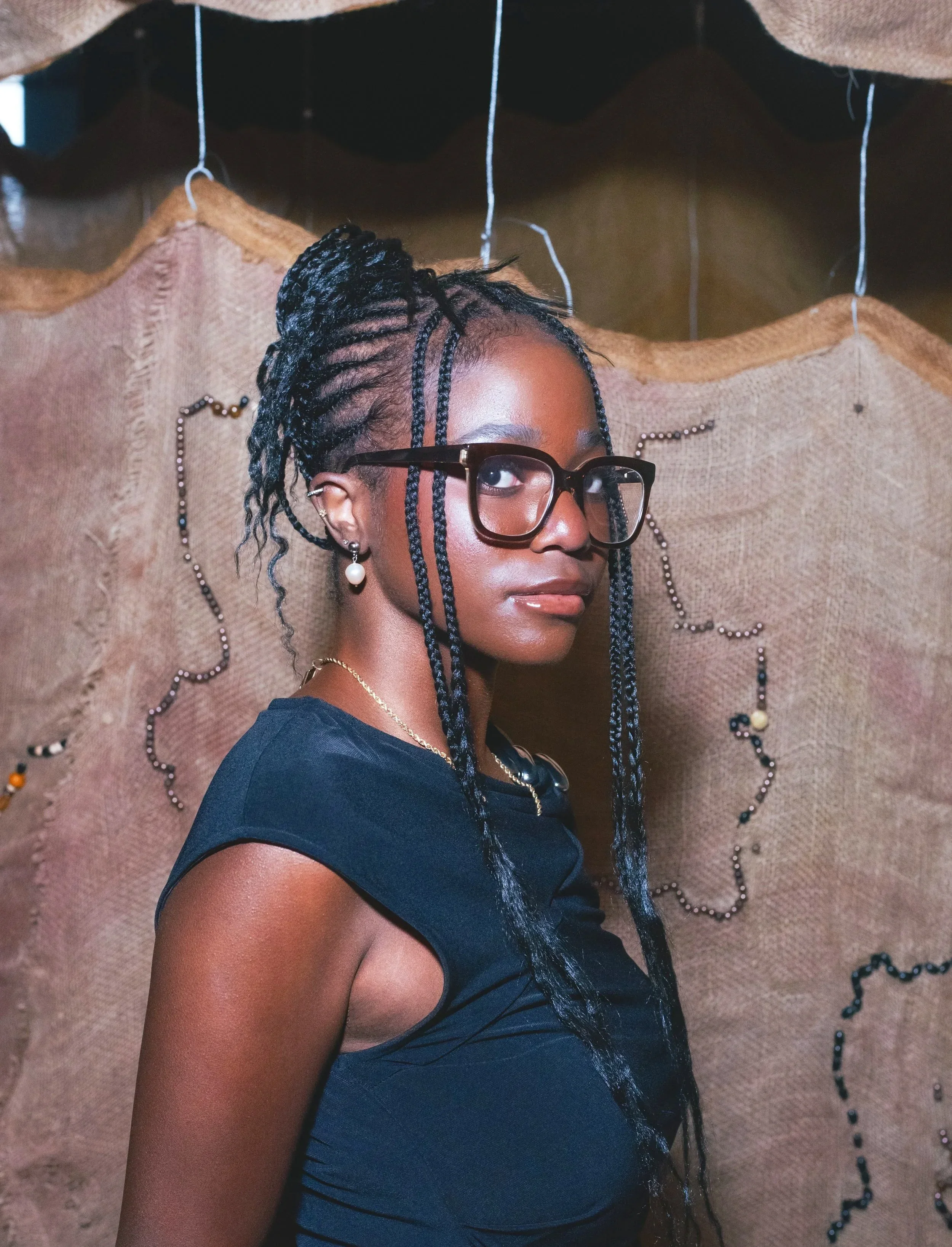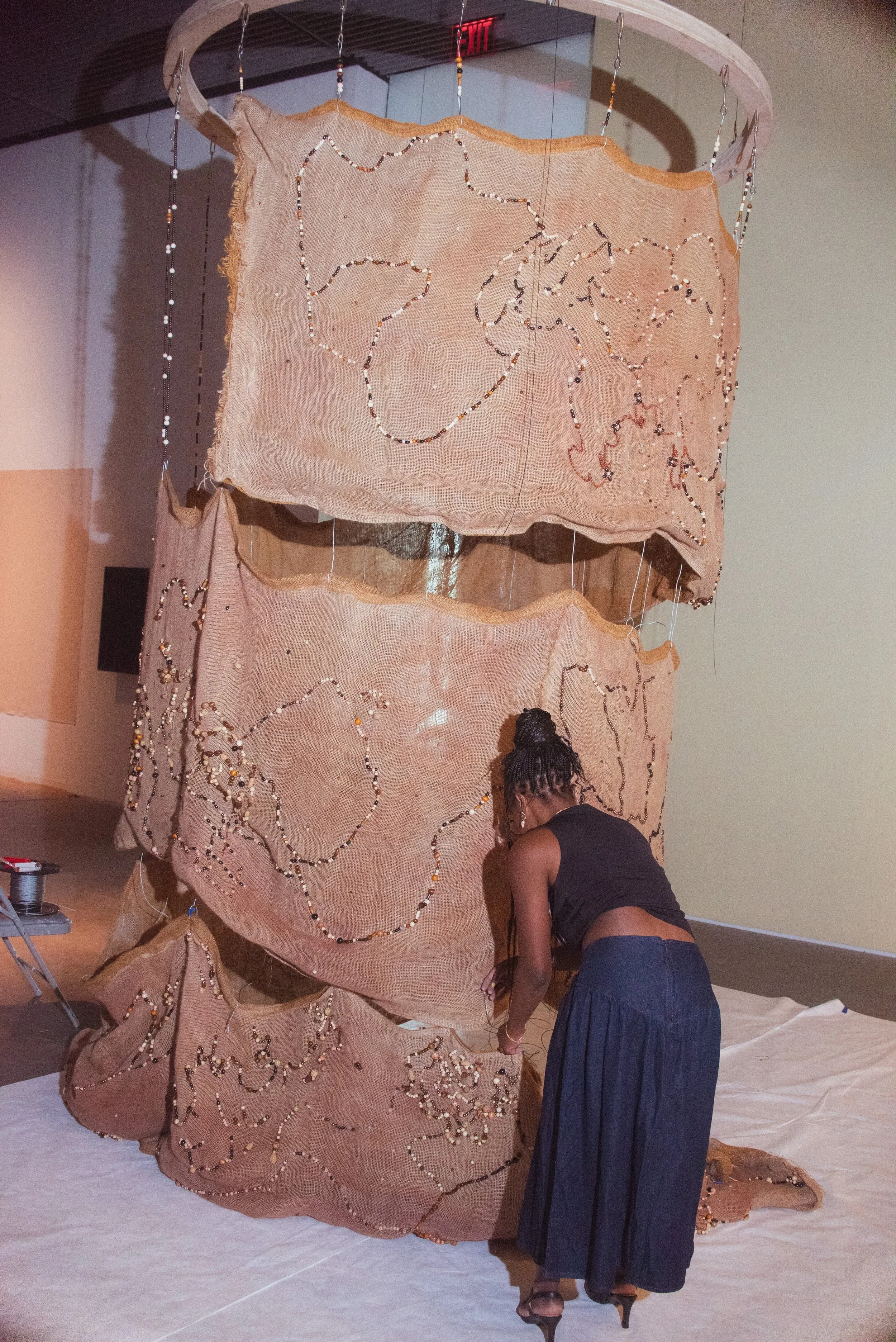For our third feature in The Shed’s Open Call: Portals series, we step inside the world of Haitian-Canadian artist Laurena Finéus. As she prepared for the opening preview, we caught rare behind the scenes moments while she put the finishing touches on Together, We Could Have Made Mountains, her first textile installation that weaves Haitian migrant stories into a landscape of dreams, sacrifices, and shared histories. Alongside the installation, her paintings incorporate soil, mica, and natural pigments, transforming each piece into both a vessel for memory and a living archive of migration.
In our conversation, Laurena reflects on migration as resistance in the face of racial violence, the coumbite tradition of coming together in mutual support, and how working with textile and ceramic beads became a ritual of care, preservation, and possibility. She speaks to the balance between rupture and refuge, grief and futurity, and the grounding practices that keep her rooted while navigating institutional spaces.
Below is an intimate look at how Laurena’s materials, process, and community collaborations converge into work that resists erasure, honors ancestral archives, and dreams toward liberatory futures.
Laurena Finéus interviewed by Bianca Jean-Pierre and photographed by Avery Savage for SHEER.
Link: https://www.sheerworldwide.com/art/features/2025/8/7/artists-to-know-laurena-finus
Bianca: Together, we could have made mountains is such a powerful title. What were the emotional and historical through-lines that led you to create this textile and painting installation, your first textile work ever exhibited, as part of Open Call: Portals?
Laurena: I have been building a social practice for a few years now through my ongoing initiative of Nou La (We are here / We have arrived). The project began during my residency at Haiti Cultural Exchange in the summer of 2023, where I collaborated with trauma therapist Phadia Jean-Pierre to create a series of wellness workshops for the Haitian migrant community in Brooklyn. We had the opportunity to partner with several organizations in Crown Heights, including Haitian Americans United for Progress and Diaspora Community Services.
Thus, while first developing the sessions with Phadia, we understood that healing must activate the senses. Smell, touch, and sound became central pillars in our facilitation style. We emphasized joy and play often absent in the language of survival and allowed art to be a site for momentary relief. Naturally, this led me toward beading and working with textiles, two mediums already rich in repetition, intimacy, and rituals of care that anchor so many Haitian households.
These gestures are not just aesthetic; they are cultural memory made tactile. It was important for me to move at the pace of trust and to truly engage with the communities that called me in. This took time. Building relationships over the past two years meant listening first, responding later.
But when the Open Call team at The Shed believed in the mission and supported the proposal for Together We Could Have Made Mountains, it felt like the right moment to grow the work beyond my HCX residency.
In Haitian farming traditions, communal labor is called coumbite, a collective gathering where people come together to work side by side in a spirit of mutual aid. The coumbite became a part of our workshops: shared craft and shared breath. That acted as a joyful act of making that nourished our spirit while acknowledging our histories. Though this may have been the first textile piece of mine to be formally exhibited, textile has long been an active thread in my community practice.
This project was born from love, but also from our inherited silence and the invisible weights our communities carry. Through hundreds of hours of shared time, the workshops offered gentle, sacred space for reflection, inviting participants to engage in a “creative harvesting of seeds.” The project title was a direct response to the Haitian proverb “Dèyè mòn gen mòn” (“Beyond mountains there are mountains”), which reminds us that in times of adversity, we must keep climbing, even when we know there is more ahead.













